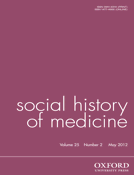-
Views
-
Cite
Cite
Sarah Marks, Volker Roelcke, Paul J. Weindling and Louise Westwood (eds), International Relations in Psychiatry: Britain, Germany, & the United States to World War II, Social History of Medicine, Volume 25, Issue 2, May 2012, Pages 552–553, https://doi.org/10.1093/shm/hkr158
Close - Share Icon Share
Extract
Whether termed ‘histoire croisee’, transnational or entangled, approaches to historical writing which focus on geographical and linguistic boundary crossings have become increasingly popular in recent years. Such approaches would appear to be particularly relevant to historians of science and medicine, given the often reiterated ‘internationalist’ character of the modern scientific enterprise, along with the field's recurring epistemological debates which call into question universalism by demonstrating local variations in knowledge production. National and local histories, through the very way they are methodologically constructed, may overlook important questions about working relationships across borders, or the elasticity of concepts as they are transferred into different contexts. As such, writing on the transnational turn in 2004, James Secord implored historians of science to re-think the traditional approach to edited volumes: ‘if you want a history that truly does the job, the answer is not to invite one contributor to discuss each country separately, but to find people willing to study different kinds of interactions, translations, and transformations’ (Secord ‘Knowledge in Transit’ Isis, 2004, 95, 4: 669). International Relations in Psychiatry is testament to how the job can be done well.




